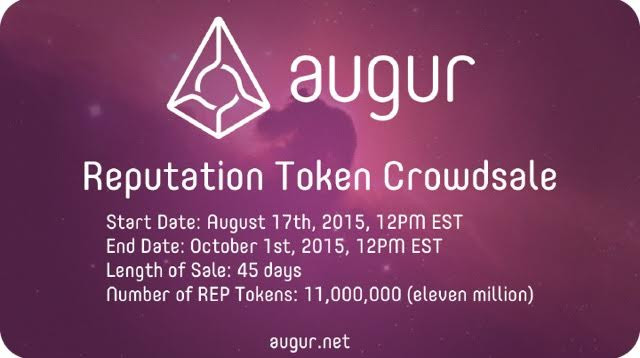Augur to issue 11 million REP tokens starting 17 August

Augur, a decentralised prediction market platform based around accurately forecasting the outcome of future events, has released details of the crowdsale of its reputation tokens (REPS), which are used as the mechanism to report on and verify completed events, resulting in a payout.
REPs, which go on sale on 17 August for 45 days until October 1, will be sold via Augur.net. The number of REP tokens being sold is 11 million.
Augur says it will unleash the true power of prediction markets by harnessing the "wisdom of crowds" – the idea that no single person or expert or small group of experts can have a monopoly on the truth at all times.
The consensus of large groups presents a near infallible way of predicting unknown events, and with this in mind Augur uses a decentralised network combined with an immutable blockchain to record predictions and outcomes. In a strange and compelling sense the technology and its scale creates a tool for accurately predicting the future.
Prediction markets can be established in anything from politics, sports, product prototyping, the weather, academic research and endless array of other possible future outcomes. It's a vibrant example of the sort of wiggy decentralised applications (DAPPs) that can be expected (predicted) to follow in lockstep with the type of technology underlying the bitcoin network.
For new technology enthusiasts and futurists alike, the issuance of the Augur tokens is also significant because it marks Augur out as the first application to run on the recent Frontier release of Ethereum, the new and long-awaited open-source blockchain architecture that runs on its own value token, ether.
Augur said it accepts both bitcoin and ether. The company added that its crowdsale process will "support development and maintenance of the Augur platform, and associated legal, promotional, administrative and logistical expenses involved in securing its widespread adoption and success".
"It will identify those who most highly value the platform, it's goals and its future. This is vital because REP token buyers will be the system's judges/referees/reporters/oracles responsible for reliably and collectively deciding whether predicted events on the system happened or not.
"The people assigned this important role must have a demonstrable, invested financial interest in the system's integrity, with their voting clout weighed proportional to the relative size of their financial commitment to the platform.
"REP token holders will collectively earn 50% of all system trading fees," said Augur.
© Copyright IBTimes 2025. All rights reserved.























